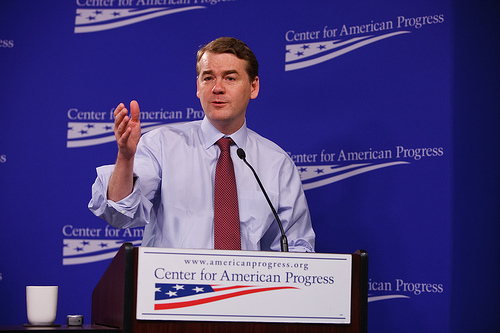 Sen. Michael Bennet (D-Colo.) was re-elected, despite the unfavorable climate. Or perhaps thanks to it!Photo: Center for American ProgressCross-posted from the Wonk Room.
Sen. Michael Bennet (D-Colo.) was re-elected, despite the unfavorable climate. Or perhaps thanks to it!Photo: Center for American ProgressCross-posted from the Wonk Room.
Colorado Republicans are going to need a bigger wave if they ever hope to wash away progressive gains and an entrenched commitment to clean energy in the Rocky Mountain state.
Victories by Democrats Michael Bennet in the U.S. Senate contest and Denver Mayor John Hickenlooper in the governor’s race didn’t just buck the national GOP trend. They sent a strong signal to progressive candidates everywhere that support for the new energy economy and fighting global warming pollution are winning issues.
Though Democrats lost two House seats in Colorado held by Reps. Betsy Markey and John Salazar, and narrowly lost control of the legislature’s lower house, by winning the top two statewide offices and keeping control of the state senate, they demonstrated a resilience unusual in a dominant Republican year.
Bennet, appointed in 2009 to fill the Senate seat of Ken Salazar when he became Secretary of Interior, narrowly defeated Tea Party and Sarah Palin anointee Ken Buck, fighting off a huge tide of outside spending by successfully painting county prosecutor Buck as far outside the Colorado mainstream.
A key moment came in late October when Buck appeared alongside the Senate’s climate change denier-in-chief, Sen. James Inhofe (R-Okla.) and endorsed the Oklahoman’s view that global warming is a “hoax“:
Sen. Inhofe was the first person to stand up and say this global warming is the greatest hoax that has been perpetrated. The evidence just keeps supporting his view, and more and more people’s view, of what’s going on.
In a state that has become a national leader in supporting clean energy as an economic and environmental imperative — the legislature this year upped Colorado’s renewable energy standard to 30 percent by 2020 and voted to convert 900 megawatts of dirty coal-fired electric capacity to cleaner fuels — that kind of anti-science rhetoric doesn’t wash. And Bennet pounced, with his spokesman calling Buck’s “extreme stance” a “threat to Colorado’s economy” and national security.
Bennet profited by a superior get out the vote effort on Election Day and other Buck missteps and extreme positions — he compared homosexuality to alcoholism and held firm to outlandish views on reproductive rights. But Buck’s support for dirty energy and hostility to clean energy finance incentives, on top of a threat to slash funding for the federal Department of Energy, played a significant role.
Bennet, said Environment Colorado program director Pam Kiely, “defied national trends thanks in part to his support of creating clean energy jobs and protecting the environment … He championed a key issue for Colorado voters — building the new energy economy.”
Hickenlooper, a strong supporter of Denver’s climate action plan to cut greenhouse gas emissions by 10 percent by 2012, defeated reactionaries Tom Tancredo and Dan Maes. Hickenlooper will continue the progress on clean energy made by Gov. Bill Ritter, predicted Pete Maysmith, executive director of Colorado Conservation Voters:
Having a “green” chief executive in the governor’s seat for at least another four years means Colorado has the opportunity to continue to be a national leader in the new energy economy.
Further down the Colorado ballot, a narrow victory by one of the legislature’s biggest supporters of clean energy kept the state Senate in Democratic hands. State Sen. Gail Schwartz was a strong advocate for raising the state’s renewable energy standard and retiring dirty coal plants, and she prevailed even though her district went Republican in the race lost by John Salazar.
Schwartz and other clean energy candidates, both state and federal, benefited from what Maysmith described as a “massive” effort by Colorado Conservation Voters, the national League of Conservation Voters, and Environment Colorado. Those groups spent hundreds of thousands of dollars and knocked on tens of thousands of doors, an effort that replicated — on a smaller scale — the successful effort in California to defeat Prop 23 that would have suspended the state’s greenhouse gas limits law.



